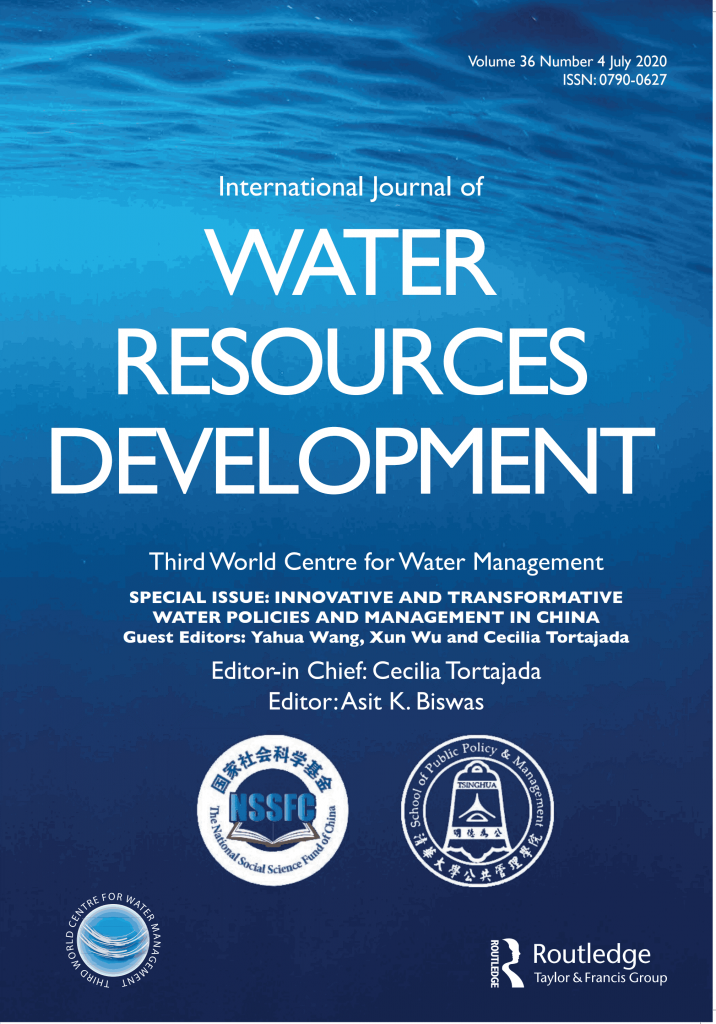
The International Journal of Water Resources Development (IJWRD) is one of the leading academic journals in the field of water resources management. Recently, IJWRD July 2020, Volume 36, Issue 4 published a special issue of “Innovative and Transformative Water Policies and Management In China” edited by Prof. Yahua Wang from School of Public Policy and Management, Tsinghua University, Prof. Xun Wu from Institute for Public Policy, Hong Kong University of Science and Technology and Dr. Cecilia Tortajada from Lee Kuan Yew School of Public Policy, National University of Singapore.
This special issue aims to critically and comprehensively analyze important innovations in managerial approaches, as well as new developments and associated challenges in water policies, by bringing together cutting-edge research and best practices on water resources management in contemporary China., and finally accepted 10 outstanding research papers, covering diverse fields including: urban water governance, water use control system, River Chief system, PPP model in water sector, water eco-compensation mechanisms, groundwater irrigation management, water rights trading, and freshwater use in China.
As Prof. Yahua Wang from the School of Public Policy and Management of Tsinghua University pointed out in the review article of this special issue, effective and efficient water resources management is key to sustainable economic and social development. China has made substantial progress in transforming water governance to respond to water crises and to support rapid economic development. In spite of this, China still faces considerable difficulties and challenges, and that there is an urgent need to improve water resources management in China by better understanding the implications of changing socio-economic circumstances, the effectiveness of new management practices, and the impacts of policy interventions. Looking to the future, some broad principles can be used to guide the transformation towards improved relationships among government, market and civil society for water governance. First, as the government plays a leading role, it should work harder to build institutions to cultivate market and social organizations for water governance. Second, market mechanisms should be actively introduced, and water-related markets can be encouraged to be established and promoted, including water rights markets, wastewater treatment markets and sewage reuse markets. Third, the participation of social organizations should be introduced into all aspects of water governance, and the establishment of various user associations should be encouraged, so that they can serve as organizational bridges, connecting the government and the people.
The development and publication of this special issue were mainly funded by the National Social Sciences Foundation of China (15ZDB164).
Yahua Wang, Xun Wu and Cecilia Tortajada
Shaofeng Jia, Dalong Li and Raymond Yu Wang
Dajun Shen, Ali Guna and Xiaodan He
Yahua Wang and Xiangning Chen
Neng Qian, Schuyler House, Alfred M. Wu and Xun Wu
Raymond Yu Wang, Cho Nam Ng and Xiaoxing Qi
Jinxia Wang, Yuting Jiang, Huimin Wang, Qiuqiong Huang and Hongbo Deng
Sicheng Chen, Yahua Wang and Jesper Svensson
Hui Guo, Xiangdong Chen, Jiahong Liu, Hongjiang Zhang and Jesper Svensson
Siao Sun, Chao Bao and Chuanglin Fang
For details of this special issue, please see the following link:
我们是国际公共事物学会的一个子页 © 保留所有权利
We are a Chapter of the International Association for the Study of the Commons